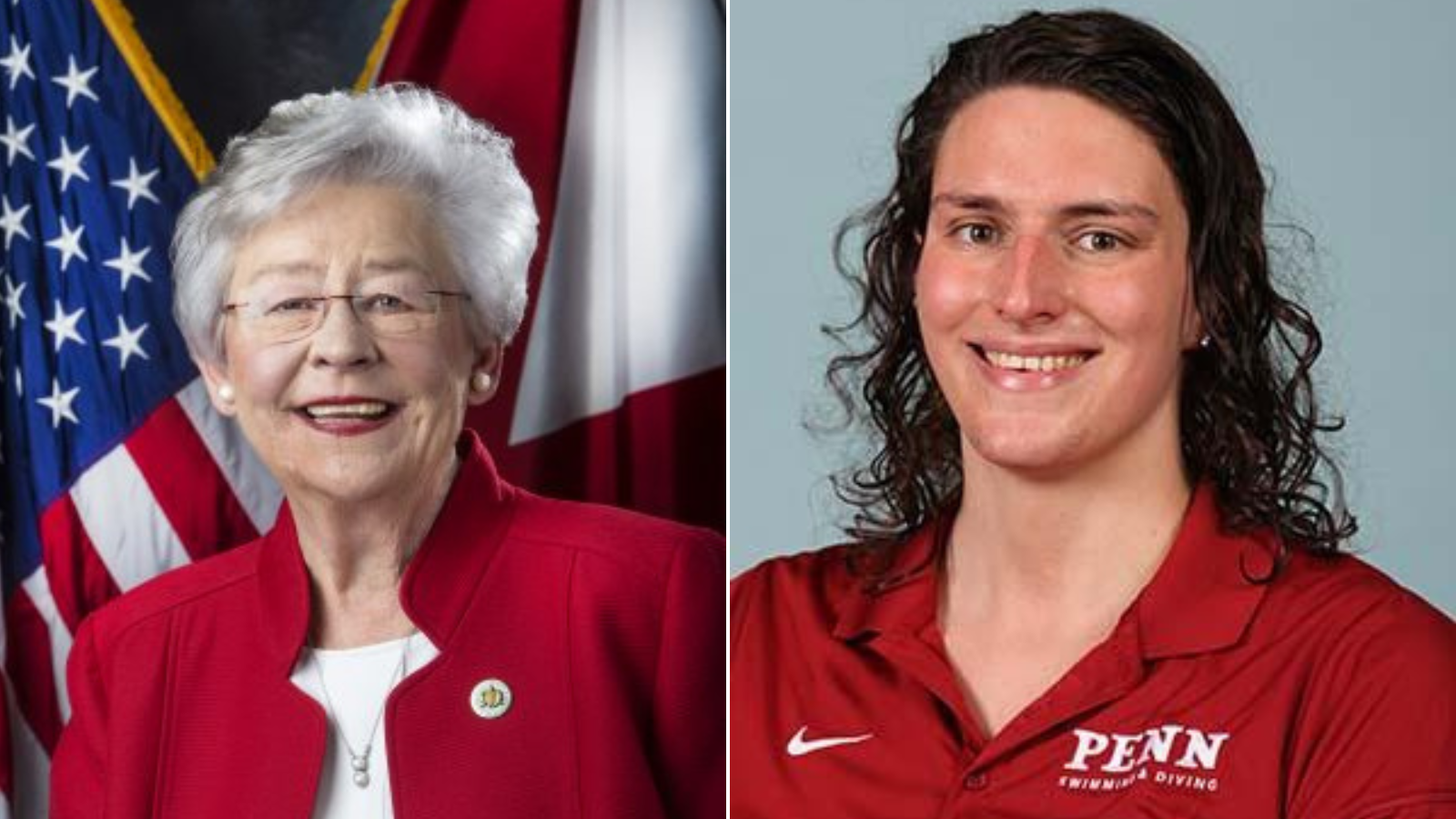Gov. Kay Ivey (R-Ala) (left) and University of Pennsylvania male swimmer Will "Lia" Thomas | State of Alabaman / Penn Athletics
Gov. Kay Ivey (R-Ala) (left) and University of Pennsylvania male swimmer Will "Lia" Thomas | State of Alabaman / Penn Athletics
As President Biden proposes a new rule that would amend Title IX to forbid U.S. schools and colleges from enacting bans on boys participating in girls sports, an analysis by Yellowhammer Times shows that Alabama is one of 21 states that bans boys from playing girls high school sports.
In April 2021, Gov. Kay Ivey (R-Ala) signed into law HB391, which establishes separate sports categories based on gender in K-12 public schools, prohibiting male-born athletes from participating in the girls' category under any circumstances. It also restricts female-born athletes from joining boys' sports, except when there are no comparable opportunities available for girls, such as football.
As of publication time, there are 29 states that still allow boys to participate in girls high school sports. These states are Alaska, California, Colorado, Connecticut, Delaware, Georgia, Hawaii, Illinois, Maine, Maryland, Massachusetts, Michigan, Minnesota, Missouri, Nebraska, Nevada, New Hampshire, New Jersey, New Mexico, New York, North Carolina, Ohio, Oregon, Pennsylvania, Rhode Island, Vermont, Virginia, Washington, and Wisconsin.
In April 2023, the U.S. Supreme Court declined to overturn a lower court ruling that had blocked West Virginia’s enforcement of its law, signed into law in April 2021, that banned boys from participation in girls high school sports. Those court rulings are expected to be challenged.
In December 2022, a federal appeals court rejected a challenge brought to Connecticut’s allowance of boys participating in girls sports. A lawsuit was filed in 2022 by three high school girls against the state’s policy, saying it was unfair. Alliance Defending Freedom (ADF), the non-profit providing legal representation to the three girls, said it’s considering a challenge to the ruling.
“Girls deserve to compete on a level playing field. Forcing them to compete against boys isn’t fair, shatters their dreams, and destroys their athletic opportunities,” said ADF Legal Counsel Christiana Holcomb.
There has been rapid growth in diagnoses of "gender dysphoria" in recent years, with this Reuters analysis of Medicaid finding that 42,000 children and teens in the U.S. received a diagnosis in 2021 — nearly triple the amount from 2017.
"Overall, the analysis found that at least 121,882 children ages 6 to 17 were diagnosed with gender dysphoria from 2017 through 2021," said Reuters.
A 2016 review in the Journal of Adolescent Health called children with gender dysphoria "singularly vulnerable" due to high rates of depression, self-harm, and even suicide. The American Psychiatric Association's "Diagnostic and Stafistical Manual of Mental Disorders" holds children are not fully capable of understanding what it means to be a man or a woman, adding that most questioning their biological sex eventually come to accept it and stop "identifying" as the opposite one.
The issue of gender dysphoria and school sports hasn't been limited to high school. In March 2022, University of Pennsylvania male swimmer Will "Lia" Thomas won the women's NCAA swimming championship in the 500 yard freestyle.
University of Kentucky swimmer Riley Gaines, who tied with Thomas in the 200 freestyle event at those NCAA championships, called Thomas a “cheat.”
“Lia Thomas is not a brave, courageous woman who EARNED a national title,” tweeted Gaines. “He is an arrogant, cheat who STOLE a national title from a hardworking, deserving woman. The @ncaa is responsible.”
Florida Gov. Ron DeSantis, who in April 2021 signed legislation banning boys from participating in girls sports, slammed Thomas' participation in women's events as an effort to "destroy women's athletics."
"The NCAA's actions serve to erode opportunities for women athletes and perpetuate a fraud against women athletes as well as the public at large," the proclamation read. "Florida rejects the NCAA’s efforts to destroy women’s athletics, disapproves of the NCAA elevating ideology over biology and takes offense at the NCAA trying to make others complicit in a lie."
Which states have banned boys from participating in girls high school sports — and which states still allow it?
* 2022: Federal appeals court rejects challenge to Connecticut's policy allowing boys to participate in girls sports.
** U.S. Supreme Court declined to overturn federal appeals court ruling blocking WV enforcement of state ban.
Source: State statutes and codes





 Alerts Sign-up
Alerts Sign-up